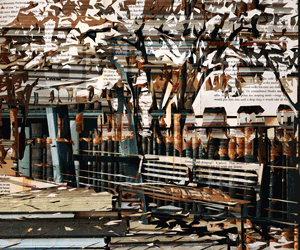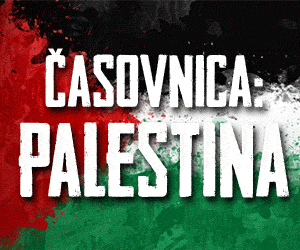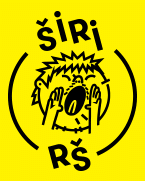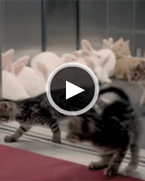BATIDA
Pred nastopom v Stari mestni elektrarni v Ljubljani smo se pogovarjali s Pedrom Coquenãom, ki bo s svojim umetniškim projektom Batida zaključil letošnji festival Druga godba. O njegovih začetkih, ustvarjanju med Angolo in Portugalsko, trenutni lizbonski sceni in spajanju afriških ritmov s sodobno elektronsko glasbo več tudi v spodnjem zapisu intervjuja.
As we know you are no stranger to Radio Študent. But to present you a bit more to our listeners, can you tell us more about who Batida is and what were your musical beginnings like?
So, I use Batida to sign the work that I do since 2007. It started as a radio show and for some reason I decided to experiment with some stuff while producing the show. The idea was to build bridges between old music from Angola and the new trends that were happening at the time – it was a mix between the traditional rhythms like semba, kazukuta, kuduro and afro house. When I started making the radio show I noticed that there were not that many producers doing these kind of blends, so I started testing my own bootlegs. The reaction I got to the first one, Bazuka, was so great that I did the second one and at some point I had the album. Then the offer to present it live for the first time came and that was a different challenge – to bring what I did in the studio to a live stage.
What I try to do on stage is to present the record and, at the same time, the things that are more natural to me, which is to bring people together – different artists, art forms, choreography ... After all this time, what I discovered is that this kind of representation which I am doing on stage is very similar to things that I used to do while I was a kid with my cousins on family meetings ... When we got together, it was a chance for all the kids to play, to hang around. And I used to challenge everyone to do shows where I used to choreograph my cousins and ask them to make covers ... We used to play instruments that our fathers had in the living room, like marimba, or cuicas or other stuff. So, music was always around me on family meetings and in my family house, but the first time I decided to produce something and to do music on my own was with this Batida name was around 2007 while I was making the radio show. It shows everything that I like – radio, music, dancers and documentaries ... So Batida is actually the name that I use to present what I have been doing.
You mentioned that now you are playing more live shows and we know that you will arrive to Druga godba festival with a VJ, a dancer, MC and other musicians. Can you say that you are a narrator because of the way you present your music and you just don’t put the music out there?
No, I don’t have the skill to do the DJ thing in terms of putting my arms up and shouting out to people to make noise. I think that there are many people that do it very effectively, but I just don’t have that skill. And it’s not that enriching or rewarding for me as I want it to be. For me to go on a stage is more to have an experience similar to being on a big dance floor, but with everyone together ... What I want is that the stage reflects the idea that I have in my head and hopefully the audience will be a part of it, but if it is not, the representation will be there. I try to be surrounded by as many people as I can bring with me. In this case it will be probably five, but ideally it would be hundred or two hundred. I rely on the people that I bring, but also on the public to be part of the show. In case they are not, I have dancers. They are very important to the music that I do, and though I like to dance, I prefer to have someone who represents me better than myself. So I bring a dancer to do it, I also bring VJ’s work, which is based on many researches that I did in the national archives to context every track that I play. There is also MC to help me out on some vocals and to give some words to some of the tracks – that is usually one MC, who participates on the album and also a drummer. Though I make my own beats, I think live it is also interesting to have them played by someone else instead of just dropping the drum machine to be playing your beats ... The narration is important part of the story, though there are many people in Lisbon that have similar story, the story of coming from over seas, and growing up here, but listening to stories from somewhere else ... It is this situation, being with one foot on one side and with one on the other. It is a common story for many people living in Lisbon, but it’s not so easy to understandable for people outside the city...
I try the show to be as flexible as possible, so I can be providing the information to the people that are interested or providing just fun to the people that are just into having fun. I think both things are a part of our life. Just dancing, just enjoying ourselves, and of course, thinking a bit more. I don’t want to be just one or the other, because its not the way I live. I try to provide as much of both as I can so the people can choose which one they like. It is almost like, thinking on tracks like Bazuka, or Alegria, Bazuka is mostly about sad story and about war and about this kid that was drafted and had to fight for all the sides suring war, and Alegria is just about dancing and feeling happy. So they are almost the black and white of what I do ...
The dance factor is very important to me. I even read it recently, which was kind of interesting to discover that many people all over the world, many old tribes, old communities, they use many languages, they don’t distinguish music from dance. So, it is the same word, things are not different. When you say I am going to make music you are also saying I am going to make dance. If you say I am going to dance you are at the same time thinking on making music. So for me it is very difficult to do one thing without the other. So, when I am going on stage (and because I don’t rely on my dance moves, I prefer to keep them to myself, for when I am alone so no one discovers my secret moves), I always try to bring someone that can showcase the ideas that I have in my mind. And at the same time, to showcase artists. Because when you do radio, and if you are a radio person, I think that is something that you will never quit on, which is also kind of to showcase other artists. Yourself, as a radio person, you have the pleasure of being communicating yourself and talking on the radio, but also to share with your listeners the things that you are discovering and that you are meeting. So, I have the same thing. I like to communicate what I do and what I am but also of course, here and there, to showcase other artists that I love and that I discovered, that came across me.
And how do people respond to the show?
Very different reactions ... In an ideal world I would say that I create a show as it was made for myself. I try to provide as much things as possible, if someone is watching they can feel happy just for dancing or they can feel interested in any information I provide. The reactions are different, but always positive. There is this sense of coming together, to make a connection – to reach out to every one and to feel that we are all part of something together on that experience is always there. And that is actually what my goal is – at the end, regardless of all the information and all the difference that we all have, different cities, different backgrounds, that we all feel that we have something in common and that we reached a point where we are all in the same level and we are all part of something together, which is actually what I want to feel on stage and on every room I go so hopefully and because I know that you have been providing some support for a long time and many people that will be on the show, they know something about what I do, I am hoping that it will be easy to have that kind of love being celebrated together on the show that I will have.
You said that you use samples from Angolan music, what kind of samples do you use, can you tell our listeners more about the genres that you use, on how do you make your music, where did it came from? Because we know that you were born in Angola and how much does this influence you and do you feel maybe as Angolan or do you feel more Portuguese?
No, I feel that I am both ... I am not much into nationalities, as much as I travel and as much as I meet people, I understand that we can be part of many places. You can find love in very different places. Its like your family, you don’t decide your family, you don’t decide where you are born. After some time you discover that you are more at home somewhere than in your home. It’s not like that every member of your family is great or that every member of your village is into you or fully understand you. So, I was already in the place where I was born, which was in Huambo, Angola. I love to be there and I have of course lots of connections with the place, because I grew up listening about Angola. Everyone in my family, most of them, they are from there, or they came from there, they were half Portuguese, half Angolan ... I was born out of that context. That is very important for me, the context in Angola, in the cities like Huambo or Luanda, and of course the context of growing up in Lisbon. I feel very attached to the backgrounds of these two cities. But I also have lots of love for other cities that I met in between, like Cape Town or New York, some cities in Brazil, in the north, because they are almost the same thing as being in Angola. And as much as I travel with the show I discover cities with which I relate more ... but my context is definitely influenced by the city of Lisbon and Angola.
The way it influences me is mostly through the memories that I have. I remember when I was a kid listening to parties, my family parties, where everyone was listening to semba, which is a national urban music from Angola from the 60s or 70s. It was the music that brought people to cultural independence, that served both propaganda and identity building ... so semba, mostly, but than you also have variations, like kazukuta, which is a carnival rhythm from Angola, and all the kizombas and the kuduro beats ... When I was a kid I was listening to some of these genres at home without necessarily wanting to listen to them, but when I got to my teenage age I was discovering my own ways, and actually trying to mingle with my friends at school ... In school I would listen to punk, indie, hip hop or electronic music an at some point I was not that much related to this African backgrounds. But after a while, for some reason, I discover that I had the need to match these new influences with the old ones and every time I listen to a guitar from the 60’s and 70’s from Angolan music they always kind of touched me in some sense, they always made me feel very close to it, very emotional, very attached to them, so the first time I tried to make a musical production for some reason I had the need to go look for that particular sound. Therefore I sampled chops of these beats of songs, I always like to have some drumming on my tracks – some old drums, some traditional or ethnic drums, or just drums I play on my own these days. There are some particular instruments that are dear to me, like the dikanza, which is kind of an Angolan guiro, the puíta, which is kind of the samba cuíca ... But it is not that I have a formula, because I am just learning how to make music and this is only my second record so I still don’t have an average of what I do. I have just 2 examples of what I can do. I don’t like to make rules out of two, but I think if you listen to both albums you will see that there are some things in common, you will find some syncopated rhythms, some beats that are associated to Angola, but also others, that can be associated to South Africa, or Nigeria ... But mostly my influences are the music that I heard when I was a kid, then the music that I feel in love with while being a teenager. What I do probably is a result of all this mixes. But it’s not something that I do consciously or as formula or that I decided.
Every time I try to make a beat, even if I think I am going to make a perfect house beat, no, at some point it gets a bit more messy, and the beat is not so disco as it should and it doesn’t go like that. And if I try to make a standard kuduro beat it starts off as a kuduro beat but then at some point it moves in some different direction because its not that I can be focused on only one thing, I like to bring different things together and to make bridges ... and having the chance to be as close as possible to different people, people that I feel relate to myself, not necessarily on being Angolan or being just Portuguese. I like more the idea a world where people can travel and feel loved in different places and not necessarily only in their home. This idea, even the idea of a country like Portugal, if you think a bit on the way the country was built. The county was roman and it was north African before it was European because of the way it was created ... at the same time Angola was not an African country, it was lots of kingdoms, lots of tribes, lots of different countries which were put together by force. So it’s not like Angola is an African country ... So in the end, maybe I am Angolan and Portuguese in that sense that we kind of grew up mixed with all these different backgrounds, but yeah I mostly focus on just being honest and reach out for people. Not necessarily to represent something in a pure way other than being truthful to what my heart feels.
To return a bit to your records, Batida and Dois, we hear many musicians there, MCs, to mention maybe Ikonoclasta and Beat Laden. How did you came across these guys, where did you meet, how did you began to work together?
Every person is a different story actually. For example, Ikonoclasta, I met him because I was doing a radio show that was called Fazuma. He was a listener of the show and he reached me out, we traded some emails and later on I discovered that he was also a musician because I received a CD by a band called Conjunto ... and I just loved their record, it still is one of my favorite records until today. So I discovered that I had this listener that was part of my favorite records ever and we started talking. I even did my first remix ever to them and so I met all the band members but for some reason Ikonoclasta was always a person that was very close to me and we see ourselves as brothers in the blood sense of the word. So this is a good example of someone that I meet through music and what I do, and then it moves to be a family member. So when I started to make my first record, at some point I knew that he would be involved in two tracks on the first one and on this one in another two bringing the lyrics because he is definitely one of my favorite MCs in Angola. If I had to point out some, I would say MCK, Ikonoclasta and Phay Grand ... And later, Sacerdote, which I also met in Luanda, when he was selling pirate CDs on the street and started talking to me. He was a rap MC and when I was filming a documentary in Luanda, I challenged him to make a freestyle on a kuduro beat and his lyrics were so honest and so interesting that we kept on talking ... He is great, a good example of kuduro with very interesting lyrics and not so much shouting or asking people just to move their asses. It’s a different kind of kuduro.
These are mostly just people that I have met and that I fall in love in their music and at some point we just have to collaborate. We have to do something together and the best way to materialize our empathy is through making something together. It can be a documentary, it can be a video, or it can be music. With everyone it is out of that need to make this thing made of love. My criteria is based on that, the love and empathy that I have for them and that is felt also on their site. Creatively it is interesting to collaborate with other people on every song. If I am going to make a video I am going to challenge a guy that I like that makes video, so we can find new ideas. And it is always like this, people that I have met, that I have some connection with, artistic or personal, and then I have the need to materialize it on a track. It’s something that I have lots of fun with. It’s very stimulating for me to share those moments with different people, instead of being just alone in my garage, doing everything on my own. I think it is a bit sad to be always alone.
With these MCs you also comment a lot on the social and political state of both countries probably. Are there any connections between Lisbon and Luanda, what’s the situation like maybe to say in Lisbon?
For me it was always obvious that connections are unavoidable between both cities ... If you come to Lisbon you will have a bit of the feeling of being in Luanda, because there are so many people that came from Angola over the years, probably more than three hundred thousand people that are Angolan or Angolan descendants living in Lisbon. So the cities are connected, people from Lisbon live in Luanda and the opposite. And then you have all the historical connections, of course, and then you also have a lot of financial and economical connections. Both cities are very related. If it wasn’t obvious some years ago, now it is obvious. There are many political and economical connections between the family of the president of Angola and the biggest economic groups in Portugal. They are making businesses every day and they are sharing power positions on both, industry and media ... The economy in Angola is mostly oil based, Portugal is more like a typical European country but they relate to each other, because Angola uses lots of the Portuguese know how, and Portugal is getting lots of money invested from Angola. The things are always connected. If something happens here it will have some influence there and if something happens in Luanda, it affects the life in Lisbon. Through people and through families, but also through economy ... These days it is very easy to trace what is in common, and it is very easy to talk about the things that relate to both countries. Of course there are particular things to both sides, which to me is kind of great, because I don’t feel as much schizophrenic or bipolar when I am making music...
I make tracks like Pobre e Rico, which talks about racial and social issues, that relate to both countries. The lyrics say that there are no white or black or mulatto, the only thing that you have, if you want to put it simple, are poor and rich people. This is the most minimal way to put how things have evolved in both countries. The independence came as an idea to put the end of exploration of the colonial period, but then in the end, what has actually happened was that you just changed the color of who is exploiting you, but the exploration still occurs and still is happening in the same level as it was before ... So it is mostly about the people that want to be in power, and want to keep control over things, keeping the oil and diamonds. That doesn’t have the color, that is just the color of money.
So, yes, my music is mostly about the things that are not fair and the things that affect our daily life and basic rights. I am talking about education, water and health. Songs talk about this, human rights, and others, like the Bazuka, are to put out this feeling of having the experience of war. Everyone had to experience war in some sense over the last forty years in Angola or Portugal – having a family that you just lost, having to move and run from war. There are many issues that are very close and that make people very close to each other. Many musicians actually ran from war and developed themselves mostly in Lisbon, like for example Bonga, Paolo Flores and also myself.
You said that you feel more Angolan in the musical, rhythmic sense, but we read a lot of things about Portuguese music scene, especially club scene in Lisbon, and the people that play music there like DJ Marfox, Nazareth, Octa Push, they also remixed some of your tracks. Can you tell us what do we hear on the streets of Lisbon today and where do you find yourself in the scene and where is it going?
Yes, with these guys we all grew up together in Lisbon in the suburb areas like Amadora, Loures or Barreiro (there are many smaller cities around Lisbon that are part of the Lisbon territory). Nazareth is actually living in London these days, he is from Luanda and doesn’t spend much time here in Lisbon. The parents of Bruno and Leo from Octa Push are from Guinea-Bissau and the parents of Marfox are from São Tomé and Príncipe. That is the common ground. Though they are not related, they have the background of these colonial countries through parents or through the place where they lived. For example, Marfox and myself, we grew up listening to Angolan, Cape Verdean, Brazilian music, because these are the neighbors that we have. I think Lisbon these days sounds like the city is. The city has always been a mix of European and African since the first day.
Kuduro has always been here, in the clubs and in our neighborhoods, but what has happened over the last years is that instead of being only based on suburbs or in African clubs, these sounds are moving more to the downtown area, to regular clubs and to normal media ... They are being translated through the media and through the fact that now we have the internet and soundcloud. That is why people can reach out for you other places in the world. If someone in Porto or Algarve doesn’t know about you, maybe someone on the other side of the world will get to know you through your soundcloud and you will be invited to play there. That has been happening over the last years.
In the last years we also saw new labels like Enchufada (the Buraka Som Sistema label), and of course, Príncipe Discos. Here you have these people pushing this kind of music, it is not only the musicians doing music, but mostly journalists and labels pushing this scene further, because the production has always been here. At the beginning through techno and African genres which did not even have a name. Then you had kuduro as a big name, though at the beginning the kuduro was very different that what we know now. At some point kuduro was forgotten and came back later, maybe because of the international attention that it got through Buraka. Kizomba has also always been here, as well as the afro house scene that comes through Luanda, there are also South African influences and all other rhythms and variations. This is the way I see it as a radio guy, but as a producer I think that all of the people which you mentioned have very particular backgrounds and sounds. I noticed that these days many people are getting interested in the Lisbon sound which I think can be generally described as a mixed sound of all of these influences, coming the people that are growing up together here, that came from all of the countries I mentioned before. But I also think the sound is influenced through the relations with all the other cities in the world that are making electronic music. But, Lisbon has of course its own sound, which I love. Lisbon is a city that is open to Atlantic ocean, it is not a city facing Europe, it is a city facing America, facing Africa ... It is not a city that is only Portuguese or a particular Portuguese city, it is a city that could be regarded as mouth or eyes or face or a city that is facing many other cities. And I like that, I like those kind of places where you can come and you will probably find a nice place for you to fit in.
Some words for the end...
I am looking forward to come to Ljubljana, because I know that I have been getting support from your radio. Being a radio guy I have lots of love for student based radios because I feel that's where most of the new artists get more space and love. In Lisbon there is no student radio, and I feel that this kind of a radio is very important to develop new trends.
+
tune in as well / Andrej Tomažin - OM 10 - Batida
Foto – Débora Lino























Prikaži Komentarje
Komentiraj